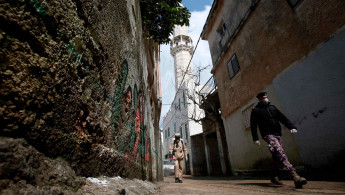Palestinian labourers continue to work in Israeli settlements despite latest virus-linked ban
Palestinian Prime Minister Mohammad Shtayyed called on Thursday on the 25,000 Palestinians who work in illegal Israeli settlements in East Jerusalem and the West Bank to not go into work.
But Palestinian day labourers have dismissed the PA's orders, opting to bring in money to feed their families over concerns of virus transmission.
"You have to adapt, put yourself in a bit of danger so you can provide food for your children," Omar Hamad, a construction supervisor from Ramallah, told Reuters.
"We have rent, we have expenses, we have lots of things."
Palestinian labourers earn more money working in Israel and in settlements that in Palestinian cities - where 15 percent of people are unemployed.
Raja Khalidi, director general of the Palestine Economic Policy Research Institute, told Reuters he was sceptical the PA would be able to enforce the ban on working in settlements.
"The (PA) cannot pay the price of cutting off the livelihoods," Khalidi said.
|
"They would be unemployed and have to fend for themselves in an otherwise hostile and depressed economic environment," he said.
Israel has confirmed over 700 cases of COVID-19, with another 48 in the occupied Palestinian territories and tens of thousands in self-isolation.
All but a handful of the Palestinian cases have been in the Bethlehem governorate south of Jerusalem and Palestinian Prime Minister Shtayyeh announced new measures Wednesday, imposing an even tighter lockdown on the city where Christians believe Jesus was born and nearby towns.
Israel closed off Palestinian-administered areas of the occupied West Bank on Wednesday to limit the spread of the coronavirus, officials from both sides said.
Israel occupied the West Bank in the Six-Day War of 1967 and exercises full control over access to the territory, which Palestinians regard as a vital part of their future state.
The Palestinian government has limited autonomy in the territory's main Palestinian population centres, apart from Israeli-annexed east Jerusalem.
Around 70,000 Palestinians in the West Bank work in Israel, crossing back and forth each day.
On Tuesday, they were given three days to either stay in Israel for the coming months or remain in the West Bank.
Thousands crossed into Israel on Wednesday morning, many carrying large rucksacks, an AFP photographer at the border reported.
Palestinians suffering from serious illnesses would still be allowed to enter Israel for treatment, Shefer said.
Read more: Israel's Mossad buys 100,000 'unusable' testing kits with wrong swabs for coronavirus
Foreigners living in Israel would no longer be able to cross into the West Bank, he added.
Around 400,000 Israelis live in settlements in the West Bank, communities considered illegal under international law.
Thousands of Palestinians are employed in them and Yotam Shefer, who heads the international department of COGAT, the Israeli military body responsible for civilian affairs in the Palestinian territories, has said they would still be allowed to enter and leave daily.
Follow us on Facebook, Twitter and Instagram to stay connected





 Follow the Middle East's top stories in English at The New Arab on Google News
Follow the Middle East's top stories in English at The New Arab on Google News


